-
 Art of Wellness Acupuncture & Traditional Chinese Medicine (TCM)11704 Wilshire Blvd, Suite 295, Los Angeles, CA, 90025
Art of Wellness Acupuncture & Traditional Chinese Medicine (TCM)11704 Wilshire Blvd, Suite 295, Los Angeles, CA, 90025
myartofwellness@gmail.com310-451-5522 Office Hours
MonClosedTue7:30 am --4 pmWed7:30 am --4 pmThu7:30 am -- 4 pmFri7:30 am -- 4 pmSat7:30 am -- 4 pmSunClosedOur office opens from Tuesdays to Saturdays 7:30 am to 4 pm, will be closed on Memorial day, Independent day, Labor day, Thanksgiving day, Christmas and New year.
-
Recent Posts
- How to Treat Rosacea With Acupuncture and TCM
- How to Treat Perioral Dermatitis With Acupuncture and TCM
- Lymphatic Drainage With Acupuncture and TCM
- How to Treat Turf Toe With Acupuncture
- How to Treat Nerve Pain With Acupuncture and TCM
- How to Treat Watery Eyes With Acupuncture and TCM
- How to Treat Ovarian Cysts With Acupuncture and TCM
- How to Treat Dystonia With Acupuncture and TCM
- Can Acupuncture Help Bad Breath?
- How to Treat Atopy with Acupuncture and TCM
- Plantar Fasciosis Treatment With Acupuncture and TCM
- How to Protect Yourself When Air Quality Is Poor
- How to Treat Spinal Headache With Acupuncture and TCM
- How to Treat Sarcoidosis With Acupuncture and TCM
- How to Treat Flu With Acupuncture and TCM
- Chinese New Year 2025 Year of the Snake
- Sign up to receive news and updates and get my free report:“The Top 10 Reasons to Try Acupuncture”

July 2025 M T W T F S S 1 2 3 4 5 6 7 8 9 10 11 12 13 14 15 16 17 18 19 20 21 22 23 24 25 26 27 28 29 30 31
Liver
Can Acupuncture Help Bad Breath?
By Qineng Tan, L.Ac., Ph.D. and Xiaomei Cai, L.Ac., Ph.D.

Dry mouth, coated tongue? Bad taste in your mouth, breath is always bad? There may be a deeper reason behind halitosis. Acupuncture and TCM can help correct the internal imbalances that are the root cause of bad breath.
How To Get Rid of Bad Breath
Looking for how to get rid of bad breath? Conventional medicine often sees bad breath as a dental issue, related to oral hygiene, gum disease, and bacteria on your tongue and in your mouth.
Recommendations for treating bad breath typically include using antibacterial mouth rinses and toothpastes, scraping your tongue, and flossing.
But what causes bad breath and dry mouth?
Bad Breath Causes
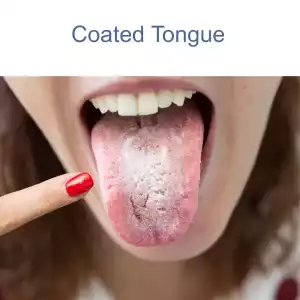
There are many health conditions that can cause bad breath, including:
- GERD – with acid reflux, some of the contents of the stomach come back up into the esophagus, which can smell strong.
- Diabetes – contributes to gum disease and bacterial growth in the mouth because of high glucose levels and poor blood flow to gums.
- Liver disease – breath may have a sulfurous, rotten egg smell, because toxins are not being adequately filtered by the liver.
- Kidney disease – can cause a metallic taste in the mouth, because minerals are not being filtered out through the kidneys.
- Sjogren’s Syndrome – parotid gland dysfunction leads to dry mouth.
- Sinusitis – mucus from sinus infection can smell bad as it drips into the back of the throat.
- Tonsillitis or tonsil stones – infected pus around the membranes of the tonsils can smell.
Other symptoms that often accompany bad breath include:
- Burning sensation on the tongue
- Need to clear your throat all the time
- Buildup on teeth, coated tongue
- Thick saliva
- Bad taste in mouth: metallic taste, sour taste, or bitter taste
Addressing these health issues can help clear up halitosis. But, what if you are experiencing frequent bad breath, and none of these health problems are the cause?
Underlying Causes of Bad Breath

According to TCM theory, bad breath usually arises from imbalances in the internal organ systems. Acupuncture treatment and herbal remedies can address the root causes of bad breath, so that it doesn’t come back.
In TCM, we consider “heat,” “wind,” “dampness,” “dryness,” and so on to be pathogenic factors that can either get into the body from external causes, or arise within the organ systems due to imbalances in Yin and Yang energies, or the obstruction or stagnation of Qi (life force energy).
Dryness and heat are the primary pathogenic factors that might lead to bad breath becoming a problem.
These words sound metaphorical, but they describe the nature of how problems occur within the human body and produce various symptoms. “Fire” or “heat” produces redness, swelling, eruptions of red bumps, thirst, excessive acid, etc.
When we say that pathogenic factors can arise from within, we are also acknowledging that emotions affect our physical and mental health, and vice versa.
Liver fire, or excess Yang energy in the Liver, for example, can arise due to dietary habits, like too much spicy food, or changes in weather, like warming temperatures in the springtime.
Liver heat is also related to feelings of anger and frustration. So, a lot of emotional stress and repressed anger can lead to liver fire problems.
Hot weather can contribute to feeling irritable. We must look at all sides of the problem in order to treat Liver fire and reduce uncomfortable symptoms, like trouble sleeping, and dry mouth.
Patterns of disharmony that can lead to bad breath as a symptoms include:
- Dry Intestine – leads to constipation and dry stool, dry throat and mouth, dizziness, hemorrhoids
- Stomach heat – thirsty all the time, craving for cold drinks, hungry all the time, canker sores, stomach pain, acid reflux, vomiting, feeling hot, acne breakouts
- Excess phlegm – tightness in chest, brain fog, dizziness
Sometimes one imbalance can lead to another. For example, liver fire can lead to fire in the lungs, causing chest pains and respiratory problems. Liver fire moving into the heart can cause angry outbursts, dry throat, and a bitter taste in your mouth.
TCM Nutrition to Address Bad Breath
Rather than simply telling you not to eat garlic, your acupuncturist will talk with you about eating the right foods to cool down the specific type of heat that is affecting your health. In TCM, we view certain foods as being “warming” or “cooling.” Eating more cool and neutral foods and avoiding heat-producing foods can help with halitosis.
An acupuncture practitioner will also assemble an herbal formula designed to address the organ system imbalances that seem to be causing problems.
Acupuncture Near Me for Bad Breath in West Los Angeles
Having bad breath can impede your social life and even your career. Experiencing dry mouth on a regular basis is very uncomfortable. It is important to address these issues, as they are likely an indication that there is something happening deeper under the surface. Please do not hesitate to reach out to us at Art of Wellness Acupuncture in Los Angeles, so that we can resolve this issue and help you feel better and more confident in your day to day life.
*This article is for education from the perspective of Traditional Chinese Medicine only. The education provided by this article is not approved by FDA to diagnose, prevent, treat and cure human diseases. It should not stop you from consulting with your physician for your medical conditions. Traditional Chinese Medicine is based on Qi, which is an invisible force that usually cannot be observed by modern science. Because science focuses on testing ideas about the natural world with evidence obtained through observation, these aspects of acupuncture can’t be studied by science. Therefore acupuncture and Chinese herbs are often not supported by double-blind, randomized trials, and they are considered alternative medicine therapies in the United States.
How to Treat Splenomegaly (Enlarged Spleen) With Acupuncture and TCM
By Qineng Tan, L.Ac., Ph.D. and Xiaomei Cai, L.Ac., Ph.D.
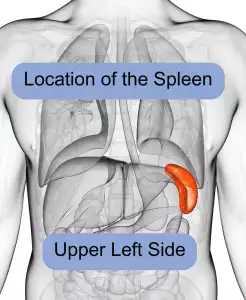
Left side abdominal pain that is tender to the touch? Feeling full after eating a small amount? Signs of anemia, bleeding easily? These may be enlarged spleen symptoms. Acupuncture and TCM can help with splenomegaly, along with spleen function and swollen spleen symptoms.
Splenomegaly is the medical term for an enlarged spleen. In conventional medical wisdom, the spleen is an organ that stores and filters blood, regulating the amounts of red blood cells, white blood cells, and platelets that are in circulation.
The spleen removes waste products and damaged blood cells from the bloodstream. It also produces antibodies (white blood cells) that fight germs and infection.
The spleen is located inside the left side of the ribcage, just above the stomach. Usually, the spleen is about the size of your fist—on average, about 12 centimeters long.
People often will not be aware of an enlarged spleen, but in some cases, there will be noticeable signs, such as pain in upper left abdomen and feeling “full.”
Spleen function is considered very important for overall health and happiness in TCM. Acupuncture treatment and Chinese herbs can provide an adjunct or alternative treatment for enlarged spleen.
Enlarged Spleen Symptoms
The most common swollen spleen symptoms include:
- Left upper quadrant pain, pain behind left ribs, left abdominal pain (upper abdomen), left side abdominal pain
- Pain that radiates to the left shoulder
- Feeling full even when you haven’t eaten
- Feeling full after eating only a small amount
- Anemia, low red blood cell count
- Bruise easily
- Bleeding easily
- Fatigue
- Catch colds frequently or suffer from other infections often
If you experience tenderness or serious left abdominal pain and feel dizzy, and/or have a rapid heartbeat, it is important to seek care immediately. These could be signs of ruptured spleen, which can lead to internal bleeding that could be life-threatening.
Enlarged Spleen Causes
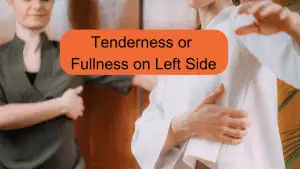
There are several different conditions that can cause the spleen to become enlarged. What causes a big spleen, or should we say, bigger spleen?
Some of the health issues that can cause splenomegaly include:
- Liver cirrhosis, or other liver disease
- Viral hepatitis, Mononucleosis, or other viral infections
- Different types of hemolytic anemia
- Blood cancers, including: polycythemia vera and other myeloproliferative neoplasms, Leukemia, lymphoma, Hodgkin’s disease
- Blood clot near the spleen or liver
- Autoimmune disorders, including Lupus or Sarcoidosis, or rheumatoid arthritis (RA)
- Malaria, or other parasitic infections
- Bacterial infections
- Gaucher disease or Niemann-Pick disease
Medical Treatment for Enlarged Spleen
The treatment of splenomegaly in Western medicine primarily depends on addressing the underlying cause of the condition.
When an enlarged spleen is caused by infections like viral hepatitis or mononucleosis, the focus is typically on treating the infection itself. Antiviral medications may be prescribed to manage viral hepatitis, while mononucleosis, caused by the Epstein-Barr virus, usually requires supportive care. Rest, hydration, and over-the-counter pain relievers like acetaminophen or ibuprofen may be recommended to alleviate symptoms. In some cases, particularly when there’s a risk of the spleen rupturing, patients may be advised to avoid contact sports or strenuous activities.
For blood disorders that cause an enlarged spleen, treatment typically involves managing the specific blood condition. For example, in hemolytic anemia, where red blood cells are destroyed faster than they can be produced, treatments may include blood transfusions, corticosteroids to suppress the immune system, or medications like rituximab.
In conditions like polycythemia vera, where there’s an overproduction of red blood cells, treatment might involve phlebotomy (removing blood from the body) to reduce blood volume, or medications like hydroxyurea to suppress the bone marrow’s production of blood cells.
When liver disease such as cirrhosis is the cause of splenomegaly, the treatment approach focuses on managing the liver condition. Cirrhosis management may include lifestyle modifications such as reducing alcohol intake, using medications to control liver damage, and managing complications like portal hypertension. In severe cases, a liver transplant may be considered. Controlling the liver condition can help reduce spleen enlargement.
In cases where the spleen enlargement is due to cancers like leukemia or lymphoma, treatment usually involves chemotherapy, radiation therapy, or targeted drug therapies to address the cancer. The goal is to reduce the size of the spleen by shrinking the cancerous cells that are contributing to its enlargement. In certain situations where the spleen is significantly enlarged and causing symptoms, or if it’s not responding to other treatments, splenectomy (surgical removal of the spleen) might be recommended.
Autoimmune disorders like lupus or rheumatoid arthritis can also cause splenomegaly. Treatment for these conditions often involves immunosuppressive medications such as corticosteroids, methotrexate, or biologic agents that target specific parts of the immune system. By controlling the underlying autoimmune disorder, the symptoms associated with spleen enlargement can often be managed effectively.
When does an enlarged spleen need to be removed?
In some cases, if the spleen is severely enlarged or if it’s causing significant symptoms or complications (such as a high risk of rupture), a splenectomy may be considered. This surgical procedure involves removing the spleen entirely. While splenectomy can relieve symptoms and prevent complications, it also has long-term implications, as the spleen plays an important role in the immune system. Patients who undergo splenectomy may require vaccinations and prophylactic antibiotics to reduce the risk of infections.
Unless the spleen is ruptured, in most cases, a splenectomy is not necessary. Trying a holistic approach with TCM and acupuncture may be able to help relieve symptoms and improve spleen function.
Can Acupuncture Help Enlarged Spleen?
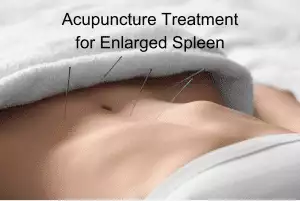
Traditional Chinese Medicine takes a different few of key organs and organ systems than we are used to in modern medicine.
In TCM, the spleen is considered vital to the digestion of food, working in harmony with the stomach. The spleen is also partially responsible for the transport of blood and water throughout the body, delivering nutrition to the muscles.
The spleen is also vital to the proper excretion of waste. When there is a buildup of excessive fluids or “dampness” in the body, it is often due to a deficiency of the spleen.
Fatigue and a sense of fullness after eating are considered signs of spleen deficiency, which can affect whether or not other organs are getting the nutrition they need.
Problems with the spleen may also be related to the liver and/or the stomach, so the acupuncture practitioner will carefully look at all of a patient’s presenting symptoms to determine the appropriate diagnostic pattern and course of treatment.
In TCM, organs are related to certain emotions, and the spleen is connected to anxiety. Thus, worrying, overthinking, and other manifestations of anxiety are believed to negatively impact the spleen.
TCM treatment to help strengthen spleen function may focus on clearing stagnation and dampness, and improving circulation of blood and Qi. Your acupuncture provider can develop a course of treatment with acupuncture and herbs to address the underlying causes of an enlarged spleen, while also helping to relieve any symptoms of splenomegaly.
Acupuncture for Enlarged Spleen Near Me in West Los Angeles
If you are experiencing enlarged spleen symptoms, acupuncture and TCM offer holistic approaches that can support spleen function and address the root causes of various health issues. At Art of Wellness, our experienced practitioners can help tailor a treatment plan to your unique needs. Contact us today to learn more about how TCM can benefit your health and well-being.
*This article is for education from the perspective of Traditional Chinese Medicine only. The education provided by this article is not approved by FDA to diagnose, prevent, treat and cure human diseases. It should not stop you from consulting with your physician for your medical conditions. Traditional Chinese Medicine is based on Qi, which is an invisible force that usually cannot be observed by modern science. Because science focuses on testing ideas about the natural world with evidence obtained through observation, these aspects of acupuncture can’t be studied by science. Therefore acupuncture and Chinese herbs are often not supported by double-blind, randomized trials, and they are considered alternative medicine therapies in the United States.
How to Treat Cirrhosis With Acupuncture and TCM
By Qineng Tan, L.Ac., Ph.D. and Xiaomei Cai, L.Ac., Ph.D.
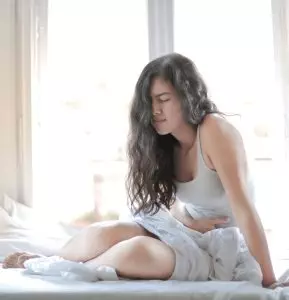
Tired all the time? Upper right abdominal pain? Itchy skin? Muscle cramps? These can be cirrhosis of the liver symptoms. Acupuncture and TCM can help relieve liver pain due to cirrhosis and help to improve liver function.
Cirrhosis of the liver is a serious and progressive condition characterized by the scarring of liver tissue, which can lead to liver failure over time. This condition can be caused by various factors, like chronic viral hepatitis infections, primary biliary cirrhosis, and long-term alcohol overuse (alcoholic cirrhosis).
Other conditions that cause cirrhosis include: cystic fibrosis, autoimmune hepatitis, non-alcoholic fatty liver disease, hemochromatosis (iron buildup), and primary biliary cholangitis (hardening of the bile ducts).
The liver is a vital organ responsible for detoxifying harmful substances from the body, producing bile to aid in digestion, and storing nutrients. When cirrhosis of the liver occurs, these functions are significantly impaired, which can lead to a wide range of health problems.
Cirrhosis of the liver symptoms can vary depending on the severity and progression of the disease. Many people have liver cirrhosis without realizing it, as it is possible to have cirrhosis for years without being symptomatic.
Top 10 Symptoms of Cirrhosis of the Liver
Cirrhosis symptoms include:
- Bruise easily, bleed easily
- Nausea
- Fatigue, drowsiness
- Lack of appetite
- Itchy skin, pruritus
- Edema in legs, edema in ankles, edema in feet
- Jaundice – yellow eyes, yellow skin
- Spider veins
- Pale fingernails, clubbed fingers, red palms
- Cognitive difficulties, slurred speech
Cirrhosis can affect menstruation, causing irregular periods or no period, and cause female infertility. Cirrhosis can also affect sexual function (erectile dysfunction/ED), libido and male fertility.
In its early stages, cirrhosis may present with mild or no symptoms, making it challenging to diagnose without medical testing.
An enlarged spleen can be a symptom of liver cirrhosis.
As the condition advances, cirrhosis symptoms will usually worsen, signaling the need for intervention.
4 Stages of Liver Disease
It is important to recognize the stages of cirrhosis of the liver. Early intervention can help slow down the progression of liver disease.
- Stage I: Steatosis (Fatty Liver) – The first stage involves inflammation of the bile duct or liver. Abdominal pain is often the first sign. If not treated, the inflammation can damage the liver. Symptoms and inflammation are usually treatable at this stage, preventing progression to stage II.
- Stage II: Fibrosis (Liver Scarring) – Many people don’t notice symptoms until stage II or III. In this stage, scarring begins to block the normal blood flow in the liver. The liver doesn’t function properly, but with treatment, it can still recover and slow down the disease.
- Stage III: Cirrhosis – Cirrhosis occurs when scar tissue replaces healthy liver tissue. This happens over several years due to untreated disease or infection. The liver becomes hard and lumpy, making it difficult for blood to flow through it. The blocked blood flow can also affect the spleen, causing additional issues.
- Stage IV: Liver Failure – At this final stage, the liver stops functioning. Immediate medical intervention is needed to prevent fatal outcomes.
Early diagnosis and treatment for cirrhosis are crucial to prevent further liver damage and manage cirrhosis effectively. Acupuncture and TCM offer an alternative treatment for cirrhosis to help restore liver function.
Medical Treatment for Liver Cirrhosis
Cirrhosis treatment focuses on slowing the progression of the disease, managing liver cirrhosis symptoms, and preventing complications. The specific approach can vary depending on the underlying cause of cirrhosis, such as hepatitis, alcoholic liver disease, or nonalcoholic fatty liver disease.
Common conventional treatments and strategies used to manage liver cirrhosis include medications to reduce inflammation and manage symptoms.
For cirrhosis caused by chronic hepatitis B or C, antiviral medications can help reduce liver inflammation and prevent further liver damage.
Diuretics are often prescribed to reduce fluid retention and swelling (edema) in the legs and abdomen (ascites). Paracentesis is a procedure that drains excess fluid from the abdomen in cases of severe ascites.
Beta-blockers decrease the risk of bleeding from esophageal varices (enlarged veins in the esophagus) by lowering blood pressure in the portal vein.

Frequent blood tests, imaging studies (such as ultrasounds), and endoscopies to monitor liver function and detect complications early.
In cases where cirrhosis progresses to end-stage liver disease and liver function is severely compromised, a liver transplant is sometimes the only option. This involves replacing the damaged liver with a healthy one from a donor.
For alcoholic cirrhosis, abstaining from alcohol is crucial. Medical support, counseling, and rehabilitation programs can aid in alcohol cessation.
Lifestyle modifications, including a healthy diet, weight loss, and regular exercise, are essential for patients with nonalcoholic fatty liver disease (NAFLD) related cirrhosis. Eating a balanced diet low in sodium to reduce fluid retention and avoiding alcohol and substances that can further harm the liver.
By combining these treatments, healthcare providers aim to manage cirrhosis effectively, improve the quality of life, and extend the lifespan of individuals with this chronic condition. However, some of the medications recommended for cirrhosis, such as antiviral drugs and diuretics, can potentially cause harm to other organ systems and do not serve to address the deeper root causes of liver dysfunction. Acupuncture and TCM offer a holistic treatment for cirrhosis that takes the whole body into account.
Can Acupuncture Help Cirrhosis?
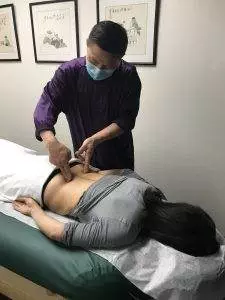
According to TCM theory, the liver is responsible not only for removing toxins from the bloodstream and body; it also disperses nutrients and medicinal substances throughout the body.
In modern life, people’s livers have to work much harder to process all of the chemicals and other toxins to which we are exposed on a daily basis. When the liver is overtaxed, it cannot provide adequate energy and nutrition, and it may not be able to eliminate all of the toxins.
This buildup of chemicals and unhealthy “food” substances in the liver contributes to the formulation of scar tissue in the liver.
Symptoms such as nausea and vomiting, diarrhea, itchy skin or skin rashes indicate that the liver is trying to purge toxins. When the liver cannot expel enough of the toxins, they will begin to affect the kidneys, too.
Medical treatments that aim to get rid of rashes or other symptoms may help the person feel more comfortable, but they do not help the root cause of the problems in the liver; they only cover them up. The use of antiviral and antibiotic medications, likewise, may seem to be taking care of infections, but they are potentially causing further damage to the organs.
In TCM, internal pathogens like cold, damp, and stagnation affecting the organ systems contribute to disease. Liver disease is not only about the liver, but also the kidneys, heart, stomach, and spleen. Symptoms like stomach distension, edema in the legs and feet, varicose veins or spider veins, and jaundice occur because of deficiencies in the various organs.
An acupuncturist will listen and observe each individual’s symptoms carefully to see which organs are affected. The TCM treatment plan will then involve acupuncture treatment and herbs to help strengthen all of the organs (heart, kidney, spleen and stomach), not just the liver.
A review of 15 studies in China in which TCM was used to treat liver cirrhosis concluded that acupuncture is effective both as a primary treatment and an adjunct treatment for chronic liver disease, helping to relieve symptoms and improve liver function.
If acupuncture treatment is sought before there is too much liver damage, TCM can help slow the progression of the disease and reduce painful symptoms.
One study showed that four weeks of electro-acupuncture treatment helped to reduce muscle cramps in liver cirrhosis patients.
Acupuncture helps to treat the underlying conditions that cause cirrhosis, including hepatitis, and fatty liver disease.
Another study showed that patients who received acupuncture treatment in addition to conventional treatment for liver cirrhosis showed less liver fibrosis (scarring) and fewer gastrointestinal symptoms than patients who only received conventional treatment.
Most doctors will advise patients with liver disease to quit drinking and cut out certain foods. Acupuncturists have expertise in nutrition that allows them to give each patient personalized care when deciding what dietary changes need to be made. Acupuncture treatment can also be very helpful when people are ready to cut out alcohol and eat the right foods to help improve liver health.
Acupuncture Near Me for Cirrhosis in West Los Angeles
TCM has been used to help improve liver health for many centuries. Acupuncture and Chinese herbs can help address liver problems of all kinds. At Art of Wellness, we are able to help patients improve liver function and feel better through acupuncture, customized herbal formulas, and individualized nutritional counseling.
*This article is for education from the perspective of Traditional Chinese Medicine only. The education provided by this article is not approved by FDA to diagnose, prevent, treat and cure human diseases. It should not stop you from consulting with your physician for your medical conditions. Traditional Chinese Medicine is based on Qi, which is an invisible force that usually cannot be observed by modern science. Because science focuses on testing ideas about the natural world with evidence obtained through observation, these aspects of acupuncture can’t be studied by science. Therefore acupuncture and Chinese herbs are often not supported by double-blind, randomized trials, and they are considered alternative medicine therapies in the United States.
How to Treat Dermatitis With Acupuncture and TCM
By Xiaomei Cai, L.Ac., Ph.D. & Qineng Tan, L.Ac., Ph.D.
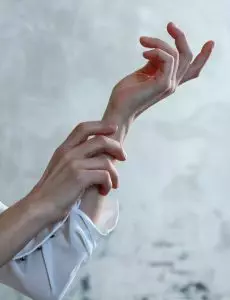
Itchy skin, dry skin irritation, or skin rash? Dermatitis is a broad term that covers many skin problems, including eczema, heat rash, diaper rash, and other kinds of skin allergy. Acupuncture and TCM offer a way to treat dermatitis, eczema, and itchy skin conditions.
The medical term “dermatitis” can refer to many types of skin irritation that involve inflammation. Inflamed skin can cause itching, redness, dryness, and rashes. A dermatitis itchy skin rash is caused by an inflammatory response related to the immune system.
Eczema, also known as atopic dermatitis, is a common inflammatory skin condition; over 30 million people in the U.S. have some type of eczema. Eczema can show up as early as a few weeks after birth in some babies, or during childhood, or during adulthood.
While what exactly causes atopic dermatitis to occur in some people is not completely understood, it is generally accepted that it is a combination of genetic, immunological, and environmental factors.
Dermatitis is not contagious; it is not passed from person to person. However, you are more likely to be susceptible to dermatitis or eczema if other people in your family have it, or if there is a family history of allergies and asthma.
Eczema and other forms of dermatitis tend to “flare up” when a person is exposed to some sort of trigger and has an allergic reaction. This could be due to something in the environment, or some product or plant that touched the person’s skin. It can also be due to internal causes, like an autoimmune problem, excess heat in the body, or emotional stress.
Signs of Dermatitis:
- Itchy dry skin rash skin irritations (pruritus)
- Red rash, red bumps on skin
- Rash like a burn
- Blisters
- Thick skin, hard skin, swelling
- Scaly skin, creasing skin
- Crusty sores, painful skin sores
- Bleeding rash, oozing skin rash
- Flaking skin (dandruff)
Symptoms of dermatitis can come and go. Scratching at itchy patches or blisters associated with dermatitis can cause a skin infection, so it is important to manage and control this condition.
Acupuncture and TCM herbs can help relieve itchy skin and inflammation, while also helping to balance the immune system to prevent further eczema flare ups.
Top 10 Types of Dermatitis
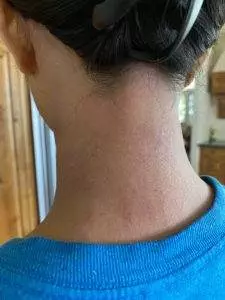
Many different conditions can cause dermatitis—meaning, inflammation of the skin. Different kinds of dermatitis include:
- Atopic dermatitis – also known as eczema, marked by dry, itchy, red patches of skin.
- Contact dermatitis – this is when a skin rash breaks out due to exposure to some kind of external irritant, such as a cosmetic product, piece of jewelry, or plant like poison ivy.
- Seborrheic dermatitis – flaking skin, also known as dandruff, occurs mostly on oily areas of the skin.
- Dyshidrotic dermatitis – (also called dyshidrotic eczema or pompholyx) small, itchy, fluid-filled blisters that appear on the soles of the feet or palms of the hands, or the tips of the fingers or toes. The blisters may break out due to exposure to an allergen or when hands and feet are often wet or sweaty.
- Diaper rash – a red rash that forms on a baby’s bottom or perineal area due to contact with the diaper and frequent wetness.
- Neurodermatitis – (also called lichen simplex chronicus) is a type of eczema marked by one or two very itchy, scaly patches that can become thickened and leathery – most often affects an area on the neck, ankle, arm, or groin. Neurodermatitis can itch so intensely that it affects a person’s sleep, and can be triggered by stressful events.
- Nummular dermatitis – (also known as discoid eczema) is marked by round, coin-shaped lesions that appear on the limbs or torso. These lesions can become infected with scratching, and may be related to poor circulation.
- Perioral dermatitis or Periorificial dermatitis – pink scaly patches or pustules that form around the mouth. This occurs more commonly in young women. Some doctors believe it may be related to candida, and/or influenced by hormones.
- Stasis dermatitis – (also called venous stasis dermatitis) itchy, scaly, discolored skin around the lower legs and ankles, due to poor circulation and blood pooling in the lower extremities.
- Dermatitis herpetiformis – a bumpy, blistered skin rash (looks similar to a herpes outbreak, but is not actually related to herpes simplex) that is related to celiac disease, triggered by ingesting gluten or wheat.
Psoriasis can look similar to eczema, but it is a separate condition that can coexist with various types of dermatitis. Rosacea redness can also look similar to dermatitis, but is a distinctly different condition that can occur at the same time as dermatitis.
What Causes Dermatitis?
A combination of the immune system reacting to irritants in the environment, and genetic predisposition.
Common environmental factors that can contribute to dermatitis include:
- Chemicals
- Air pollutants
- Fluoride in water or toothpaste
- Fragrances, perfumes, air freshener
- Fragrances in skin products, cosmetics, lotions, soaps
- Tobacco smoke
Other conditions that may occur simultaneously with dermatitis include: depression, anxiety, insomnia, allergies, and asthma.
Eczema Treatment
There are many different types of medical treatment for dermatitis. Some are topical—meaning, applied to the skin. Others are taken in an oral pill form, or injected into the skin.
Topical corticosteroid creams, which can help reduce skin inflammation, are the most common treatment for eczema and dermatitis. These can help reduce itching and swelling. However, prolonged use of topical steroids can cause side effects like thin skin, spider veins, and acne. Steroids can affect growth in children, and can cause eye problems like glaucoma or cataracts in older people.
Steroids that are taken orally, like Prednisone, can help control systemic inflammation for a time, while patches of scaly skin heal. However, there are many serious side effects associated with taking steroids for a long time, and it is also possible to experience a “rebound effect.” This means that the dermatitis symptoms come back even stronger when a person stops taking the steroid medications.
Calineuron inhibitors and JAK inhibitors are designed to stop certain chemical processes in the body related to immune responses. They can help block immune system reactions to calm the dermatitis skin problems.
There are many new types of treatment for eczema being developed. Phototherapy, or light therapy, using ultraviolet (UV) light, may be tried when topical treatments are not working for eczema that is widespread over the whole body. However, this kind of therapy can cause prematurely aging skin, changing skin pigmentation, and potentially increase the risk of skin cancer.
Acupuncture and TCM herbal supplements offer a way to treat eczema without any damaging side effects.
Can Acupuncture Help Dermatitis and Eczema?
One of the core concepts of TCM is the 5 Elements Theory, according to which organs of the body correspond with seasons and weather conditions. According to this theory, eczema and other kinds of dermatitis arise due to imbalances within the internal organ systems affected by external conditions, such as Wind and Heat.
The lungs, especially, are connected to the skin in the TCM system. The lungs can be affected by excess heat or stagnation in the liver. Thus, an itchy red rash on the skin is actually an expression of a deeper, more complex internal condition. Therefore, it is necessary to treat dermatitis and eczema not only with topical creams, but to use acupuncture and herbs to balance all of the organ systems.
The acupuncturist gets clues about which internal organs are out of harmony by observing the eczema symptoms: the type of rash or scaly skin, the color and temperature. Each individual case of dermatitis is unique, triggered by different irritants, and arising from a person’s overall state of health.
One study showed that acupuncture treatment worked better than antihistamines for helping to reduce the itchiness of atopic dermatitis pruritus. Acupuncture also helps to reduce inflammation and overall stress.
Studies done in China to determine the efficacy of an herbal formulation developed for eczema showed that it worked well to reduce itching and recurrence of rash.
As systematic review of over 350 studies on acupuncture for eczema showed the patients who were given acupuncture treatment instead of conventional treatment experienced better overall symptom reduction and quality of life.
Top 5 Tips to Prevent Dermatitis Itchy Skin

There are things you can do to help prevent eczema flare-ups from occurring and avoid recurrent rashes.
- Do not bathe in very hot water.
- Keep showers short and warm, and use gentle cleansers, without strong chemical perfumes.
- Do not scrub your skin during or after the shower, while drying. Pat gently.
- Use moisturizer frequently to maintain a protective layer on your skin.
- Wear long pants and sleeves when hiking and adventuring. Wear gloves when gardening.
Acupuncture Near Me for Dermatitis in Los Angeles and Santa Monica
Acupuncture can help relieve itching, aid in the healing of lesions, help stimulate healthier immune responses, and reduce stress. TCM treatment can also be sought as a safe treatment for children with eczema, or during pregnancy, as it is free of negative side effects.
TCM can also help patients with other skin conditions, including signs of aging, acne, hives (urticaria), rosacea, vitiligo, and psoriasis.
*This article is for education from the perspective of Traditional Chinese Medicine only. The education provided by this article is not approved by FDA to diagnose, prevent, treat and cure human diseases. It should not stop you from consulting with your physician for your medical conditions. Traditional Chinese Medicine is based on Qi, which is an invisible force that usually cannot be observed by modern science. Because science focuses on testing ideas about the natural world with evidence obtained through observation, these aspects of acupuncture can’t be studied by science. Therefore acupuncture and Chinese herbs are often not supported by double-blind, randomized trials, and they are considered alternative medicine therapies in the United States.
How to Detox With Acupuncture and TCM
By Xiaomei Cai, L.Ac., Ph.D. & Qineng Tan, L.Ac., Ph.D.
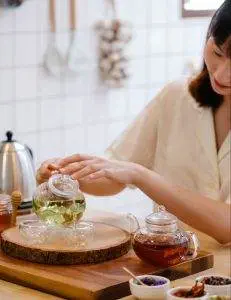
Why is it important to do a detox or body cleanse periodically? When done with the right support from an acupuncturist near me, detoxing can help improve your digestion, immune function, fertility, and many other aspects of your health. Store bought colon cleanse products or a juice cleanse won’t really do the job, though. A detox program with acupuncture and Chinese herbs will do more to optimize your health than just a detox diet will.
When we recommend our Detox Program at Art of Wellness, we are not talking about fasting or detox drinks, like a master cleanse. The goal of our program is to detoxify the organ systems of the body: it’s a liver detox, kidney cleanse, lungs, heart, and spleen. This is a full body cleanse designed to give you a health reset. According to TCM philosophy, your body knows how to repair and renew itself, but it cannot do this job when it is congested and out of balance.
In TCM, we have a broad concept of what “toxins” are and how they can affect our bodies and our health. Toxic chemicals that come from our environment, such as food additives, pesticides, cleaning products, and beauty and hygiene products are certainly part of the problem. Drugs, medicines, alcohol, and unhealthy foods can also be toxic. So can behavioral habits, like sitting and looking at our screens and devices too long.
But our own bodies produce toxins, too. The waste products our organs create are “toxic,” and if they are held in the body too long without being adequately cleared out, they can negatively impact organ function. Imbalances in the system can cause conditions of excess heat or phlegm, which can lead to all kinds of problems with both your physical and mental health.
Stress, lack of sleep, and extreme emotions can also contribute to toxic conditions in the body and mind. When the organ systems are out of balance, the body is under constant pressure to keep functioning, but we do not feel our best.
Signs you need to detox include:
- Fatigue, low energy, tired all the time
- Foggy head, memory problems, trouble concentrating
- Constipation
- Trouble sleeping, insomnia
- Weight gain
- Hair loss
- Hormone imbalances
- Signs of rapid aging
- Skin rash, acne
- Fingernails are brittle, lined or ridged
- Severe PMS symptoms or menopause symptoms
- Headaches, migraine
- Water retention, edema, swelling in extremities
Inflammation is largely created by toxic conditions in the body, and most pain conditions and chronic illnesses stem, at least in part, from inflammation somewhere.
Why You Need a Liver Detox
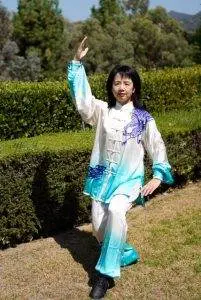
In conventional medicine, we think of the liver as being a sort of filter that removes toxins from the blood and helps metabolize fat. In TCM theory, we consider the liver to be the storehouse and distributor of blood; therefore, it also plays a crucial role in the menstrual cycle. The liver is also strongly connected to a person’s emotional life.
Stress, lack of sleep, too much sugar, alcohol, fatty, fried foods, pharmaceutical medicines, and recreational drugs all tax the liver above and beyond what it needs to do just to keep the blood flowing to nourish the body. When too many demands are placed on the liver, it can cause all kinds of symptoms, including: fatigue, insomnia, and headaches. Feelings of anger, frustration, anxiety, and irritability may arise. Conversely, when a person is feeling bitter and resentful, and isn’t able to express it, those unresolved emotions may begin to cause trouble with liver function.
Just as the liver governs the blood, in TCM, the kidneys govern the water of the body, controlling elimination through the bladder, and maintaining blood pressure by keeping the right amount of water in the bloodstream. Signs that the kidneys are not balanced include: problems with blood pressure, edema, puffiness in the face or extremities, UTIs, chronic fatigue, and menopause symptoms, like dryness and hot flashes.
Detoxing the organ systems, including the liver and kidneys especially, can help rejuvenate the digestion and allow better nutrition to reach all parts of the body, as the quality and flow of blood and other bodily fluids will be improved.
Making sure that your excretory system is in good working order before starting a cleanse is important. If you are already having problems with constipation, for example, we will want to make sure we get things moving before we start cleansing the organs. Our detox also focuses on the body’s largest excretory organ: the skin.
Top 10 Reasons To Detox
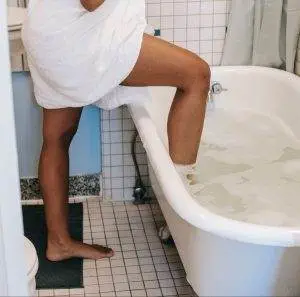
It is a good idea for everyone to detox periodically; detoxing every six months is reasonable for most people. Sometimes we will specifically recommend a detox for a patient when they are struggling with a particular health problem, or if they are planning a pregnancy.
Detoxing can help:
- Boost Immunity – a cleanse will help get your lymphatic system, which produces and transports immune cells and removes waste from cells, moving, improving the efficacy of your immune system.
- Break Free From Addiction – if you are ready, a commitment to the detox program and food plan can help you end patterns of substance abuse, drug use, alcohol addiction, smoking, and other types of dependency.
- Infertility – We often advise people who come to Art of Wellness for fertility treatment to begin with the Detox Program. Not only will this help increase the chances of conception occurring, whether naturally or with the aid of ART, but it will also lay the foundation for your child’s health in the future.
- Improve sleep – This works both ways. In order for the body to do its routine daily work of removing toxic waste, it needs plenty of sleep. The Liver, in particular, is working hard through the night to clean and deliver fresh blood to the cells. Sleeping on your side enhances your body’s ability to do this work, allowing the internal organs to drain properly. When your body is functioning well, your sleep will be of better quality, more restful and refreshing.
- Improve skin and hair – Dull eyes and skin, dark circles or bags, puffiness, and thinning hair are signs of stagnant blood and Qi. Nutrients from the right foods and Chinese herbs help to nourish the skin, and clear heat, dampness, and dryness. When old cells are removed, hair and eyes can shine again. Acupuncture treatment can help stimulate collagen production, which also happens while you sleep.
- Weight loss – While our acupuncture detox is not about how to lose belly fat fast, many people will find that it gives them a good foundation for new eating habits. Detoxing the liver and kidneys will help your body metabolize fat better.
- Balance hormones – severe PMS symptoms, bloated stomach and mood swings, perimenopause symptoms, infertility in women and infertility in men (oligospermia) can all be improved when hormone function improves. Acupuncture treatment can also help relieve conditions like PCOS, fibroids/leiomyoma, and endometriosis for women, and BPH in men.
- Reduce inflammation – many illnesses and pain conditions are inflammatory in nature. If you are suffering from pain due to plantar fasciitis, gout, rheumatoid arthritis, tennis elbow, carpal tunnel syndrome, shoulder or hip pain, acupuncture can help.
- Increased energy – better nutrition, better circulation, better sleep, and better organ function will all work synergistically to help you feel more energetic.
- Chronic illness – many chronic illnesses are rooted in toxic conditions within the body or exposure to toxins. Hard-to-treat conditions like autoimmune conditions and other systemic problems may be helped with alternative medicine when conventional medical treatments have not been successful. We treat many conditions with acupuncture and herbs, such as: lupus, lyme disease, celiac disease, fibromyalgia, and Crohn’s disease. We also provide support for people going through cancer treatment.
7 Steps of Detox Program With TCM Acupuncture and Herbs
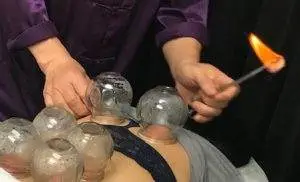
Pain and dysfunction occur when there is imbalance and when there are areas of stagnation within the body. Think of the metaphor of a house that needs to be deep-cleaned; there are dark corners of the body that have been ignored for a while, where dust and cobwebs have gathered. The Detox program reaches into these pockets of stagnation, sweeps them clean, and makes sure they get some fresh air and sunlight shining on them, in the form of invigorated Qi and blood.
- Acupuncture Treatments – the primary goal of acupuncture treatments during the detox phase is to get Qi moving freely, remove blockages, and to assist in elimination of toxins from the body.
- Cupping Treatment – the TCM modality of cupping creates a vacuum-like suction that moves Qi and blood from the innermost parts of the body outwards. During the detox program, cupping helps to pull toxins out of the lungs and other organs.
- Detox Herbs – the Chinese herb detox tea helps to clear heat and toxins from the body and improve digestion and elimination.
- Foot Pad Detox – detox foot patches, worn as you sleep at night and removed in the morning, help to pull toxins and fatty deposits from the body.
- Detox Bath – Sweating is an excellent way to remove toxins through the skin; this is why so many traditions rely on saunas and hot baths. Our herbal sachets allow you to enjoy a therapeutic herbal soak in your own bathtub.
- Exercise – Your acupuncturist will instruct you on how to practice daily exercises, based on QiGong movements, that will help to get Qi and blood moving.
- Nutrition – the food plan during the detox is based on whole grains, lean proteins, and plenty of vegetables, flooding your system with nutrients.
Detox Near Me Los Angeles, Westside
The beginning of the year, springtime, after recovery from a long illness, while preparing for a healthy pregnancy–anytime may be the right time for you to detoxify your system and get a fresh start. We recommend that you take the time to dedicate yourself to a week of cleansing with the Art of Wellness Detox Program at least twice a year for optimal health benefits.
*This article is for education from the perspective of Traditional Chinese Medicine only. The education provided by this article is not approved by FDA to diagnose, prevent, treat and cure human diseases. It should not stop you from consulting with your physician for your medical conditions. Traditional Chinese Medicine is based on Qi, which is an invisible force that usually cannot be observed by modern science. Because science focuses on testing ideas about the natural world with evidence obtained through observation, these aspects of acupuncture can’t be studied by science. Therefore acupuncture and Chinese herbs are often not supported by double-blind, randomized trials, and they are considered alternative medicine therapies in the United States.